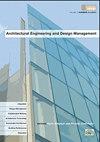Key influences to cost modelling and analysis in off-site construction: research trends and GAP analysis
IF 2.5
4区 工程技术
Q2 CONSTRUCTION & BUILDING TECHNOLOGY
Architectural Engineering and Design Management
Pub Date : 2023-11-14
DOI:10.1080/17452007.2023.2282127
引用次数: 0
Abstract
The last decade has witnessed a proliferation of Off-Site Construction (OSC) operations and systems in the UK in response to persistent performance challenges in the construction industry. However, understanding the real influences of cost modelling for accurate project costing and cost performance remains limited. Consequently, this systematic literature review aims to identify the key parameters associated with effective cost modelling in OSC systems. Using literature in the last 10 years (i.e. 2011–2021) and keyword search terms, the review covers OSC aspects such as cost modelling and models, life cycle costing, cost analysis and taking off. Knowledge gaps are identified within literature and practice in cost modelling despite a backdrop of a proliferation of OSC systems and concomitant literature. Emergent findings uncover thematic clusters in analysed literature with the role of design, 88%, costs, 69% and modelling, 74% dominating the literature reviewed. Moreover, key influences to cost modelling in OSC (e.g. abnormal costs, factory-based preliminaries, and contractor’s overheads) do not feature prominently in any published research. This paper provides a cross-sectional snapshot of contemporary developments in the field and highlights the need for new research to support integrated cost modelling to support current OSC practice.对非现场施工成本建模和分析的关键影响:研究趋势和GAP分析
在过去的十年中,英国见证了非现场施工(OSC)作业和系统的激增,以应对建筑行业持续存在的性能挑战。然而,了解成本模型对准确的项目成本和成本绩效的真正影响仍然有限。因此,本系统的文献综述旨在确定与盐盐系统中有效成本建模相关的关键参数。使用过去10年(即2011-2021年)的文献和关键词搜索词,回顾涵盖了OSC方面,如成本建模和模型,生命周期成本,成本分析和起飞。尽管在OSC系统和相关文献激增的背景下,在成本建模的文献和实践中发现了知识差距。新兴发现揭示了分析文献中的主题集群,其中设计占88%,成本占69%,建模占74%。此外,在任何已发表的研究中,对OSC成本建模的关键影响因素(如异常成本、基于工厂的前期准备和承包商的间接费用)都没有突出表现。本文提供了该领域当代发展的横截面快照,并强调需要新的研究来支持集成成本模型,以支持当前的OSC实践。
本文章由计算机程序翻译,如有差异,请以英文原文为准。
求助全文
约1分钟内获得全文
求助全文
来源期刊
CiteScore
5.80
自引率
3.40%
发文量
30
期刊介绍:
Informative and accessible, this publication analyses and discusses the integration of the main stages within the process of design and construction and multidisciplinary collaborative working between the different professionals involved. Ideal for practitioners and academics alike, Architectural Engineering and Design Management examines specific topics on architectural technology, engineering design, building performance and building design management to highlight the interfaces between them and bridge the gap between architectural abstraction and engineering practice. Coverage includes: -Integration of architectural and engineering design -Integration of building design and construction -Building design management; planning and co-ordination, information and knowledge management, vale engineering and value management -Collaborative working and collaborative visualisation in building design -Architectural technology -Sustainable architecture -Building thermal, aural, visual and structural performance -Education and architectural engineering This journal is a valuable resource for professionals and academics (teachers, researchers and students) involved in building design and construction, including the following disciplines: -Architecture -Building Engineering -Building Service Engineering -Building Physics -Design Management and Design Coordination -Facilities Management Published papers will report on both fundamental research dealing with theoretical work and applied research dealing with practical issues and industrial innovations. In this way, readers explore the interaction between technical considerations and management issues.

 求助内容:
求助内容: 应助结果提醒方式:
应助结果提醒方式:


